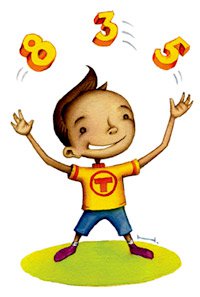Editor’s Note: Making the Most of Math
Learning to appreciate numbers.

At a recent symposium on mathematics held by our foundation, an attendee made an interesting point. "Why is it," asked Nancy Foote, of the Higley, Arizona, school district, "that if someone is not good at spelling or expressing themselves verbally, it's a social stigma? But if they're not good at math, well, that's OK."
No kidding. Try divvying up a dinner check with a tableful of journalists. They practically break into a sweat doing the math in their head. Excuses offered among the lords of language: none.
The problem begins in those formative educational years, when math seems like an arcane language with little use in the real world. This essential period of drilling, unfortunately, is rarely revealed as a means to an end, as essential as learning English grammar. It's important to understand the difference between a split infinitive and a dangling participle, but no one would pretend that's all there is to language. You want to go on to read Shakespeare and Shaw and a million other wonderful pieces of literature. That link is rarely made during math class. So budding number jockeys arrive in an intellectual cul-de-sac, wondering, "Will algebra help me arrange my living room furniture? Can trigonometry balance my checkbook? Nope. Then forget it."
The trick is getting beyond the rote memorization of numbers and into the extraordinary worlds that math reveals. Artists, philosophers, and writers such as M. C. Escher, Rene Descartes, and Lewis Carroll all used mathematics in their work. Much of the physical art of moviemaking revolves around the process of handling motion through the application of mathematics. Today, many mathematicians view their work as mental gymnastics, as invigorating as a crossword puzzle or a mystery novel.
Sonya Kovalevsky, a remarkable nineteenth-century Russian, made an important observation about this. In an age when women lived with suffocating prejudices, Kovalevsky was extraordinary for many reasons. She was the first woman member of the Russian Academy of Sciences. She was the first modern European woman to attain full professorship. In addition, Kovalevsky was the slightly odd combination of being both a talented writer and one of the world's best mathematicians. She wrote, "Many who have never had occasion to learn what mathematics is confuse it with arithmetic, and consider it a dry and arid science. In reality, however, it is the science which demands the utmost imagination. . . . The poet must see what others do not see, must look deeper than others look. And the mathematician must do the same thing."
That's it, exactly. You can quickly see one analogy when looking at a sheet of music or a page of algebra. Musicians can look at the notes and hear the tune in their heads. Likewise, an array of algebraic symbols is a mathematical symphony to the trained eye. Unless you understand the language of either, however, both are just a jumble.
Still, some believe that learning anything past the most rudimentary skills is time wasted: This business of understanding calculus and higher mathematics is useful only to people who must exploit it as part of their professional life. Better to learn PowerPoint.
It's a spurious argument. Why teach students drama or good literature? Why teach them biology? Why teach them to play a musical instrument? We can live without any of these things, but the more we know, the more we understand. And the more ways we have looking at our world, the richer we all are.
Editor in Chief
James Daly